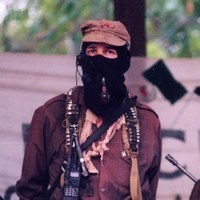By Fernando Antonio da Costa Vieira
On January 1, 1994, in the state of Chiapas, Mexico, the uprising of the Zapatista Army of National Liberation (EZLN) began. The mobilization brought to the Mexican political scene a critique of neoliberalism, a reclamation of the dignity of Indigenous peoples, an opposition to a failed political model, and a new political leadership: Subcomandante Marcos. He did not present himself as the leader of the movement—hence his title of subcomandante—but claimed to be merely a spokesperson for the Mexican Indigenous people who were fighting for land, work, and dignity. With a covered face and a deep, confident voice, Marcos quickly became the visible and controversial face of Zapatismo.
Reserved. Perhaps that is the word that best describes Subcomandante Marcos. His private life remains the subject of speculation. In 1995, the Mexican press published information leaked by the government of Ernesto Zedillo claiming that Marcos was Rafael Sebastián Guillén Vicente, born in 1957 in the city of Tampico, in northern Mexico.
After completing his basic education at the Jesuit Cultural Institute of Tampico, where he reportedly came into contact with Liberation Theology, Rafael enrolled in the philosophy program at the National Autonomous University of Mexico (UNAM), where he graduated. At university, he was said to have joined Maoist groups and, at a later point, embraced Zapatista ideals. As a professor, he took up the Indigenous cause and helped to form the Zapatista Army of National Liberation (EZLN) in the late 1980s.
But… who really is Subcomandante Marcos? Undoubtedly, this is a minor question among the Zapatista movement’s proposals. He himself, in a communiqué dated May 28, 1994, stated that he was “gay in San Francisco, Asian in Europe, Black in South Africa, Jewish in Nazi Germany, Palestinian in Israel, a pacifist in Bosnia, a dissident in neoliberalism, etc.” In other words, all the dispossessed, excluded, persecuted, and dissenters of the 20th and the emerging 21st century.
In practice, Subcomandante Marcos presents himself as the expression of a new left that incorporates demands which go beyond the dynamics of class struggle, yet represent a new level of human oppression. Without claiming to be Marxist, he uses Marxist categories. He does not hide the influence of Antonio Gramsci or his respect for the writings of Ernesto Che Guevara. He claims to owe more to the Mexican intellectual Carlos Monsiváis than to Marx himself.
Over the years, as the spokesperson for the Zapatistas, Marcos adopted a political stance of resistance to neoliberalism based on the belief that it is possible to build another world, centered on solidarity, democracy, and the defense of minority rights.
Although the family of Rafael Sebastián Guillén Vicente confirmed the Mexican government’s claims, Subcomandante Marcos never ceased to appear with his face covered. By refusing to discuss his personal life, while maintaining the romanticized leadership role portrayed by the media and the Latin American left, he keeps the focus on the Zapatistas’ struggle in Chiapas. Beyond his political activities, Marcos has published works. In 2004, he released the book Muertos incómodos with writer Paco Ignacio Taibo. He also published Our Word is Our Weapon, a collection of his writings among the Zapatistas over the past decade.
In December 2005, Subcomandante Marcos announced a tour across Mexico, which began in January 2006. The journey aimed to defend the proposals of the EZLN and explain the reasons for the Zapatistas’ distancing from the candidates running in the 2006 presidential elections.
Claiming that Andrés Manuel López Obrador, of the PRD, had sought an alliance with former president Carlos Salinas de Gortari, Subcomandante Marcos advocated for the creation of a new political force, a left truly committed to Zapatista ideals. He then assumed a new role, presenting himself as “Delegate Zero” in the effort to spread and organize this leftist alternative.
In May 2014, the commander announced that the identity of “Marcos” had come to an end. According to him, over the previous twenty years, the Zapatista schools had formed a generation capable of continuing the doctrine. Thus, the character “Marcos” was no longer necessary.



